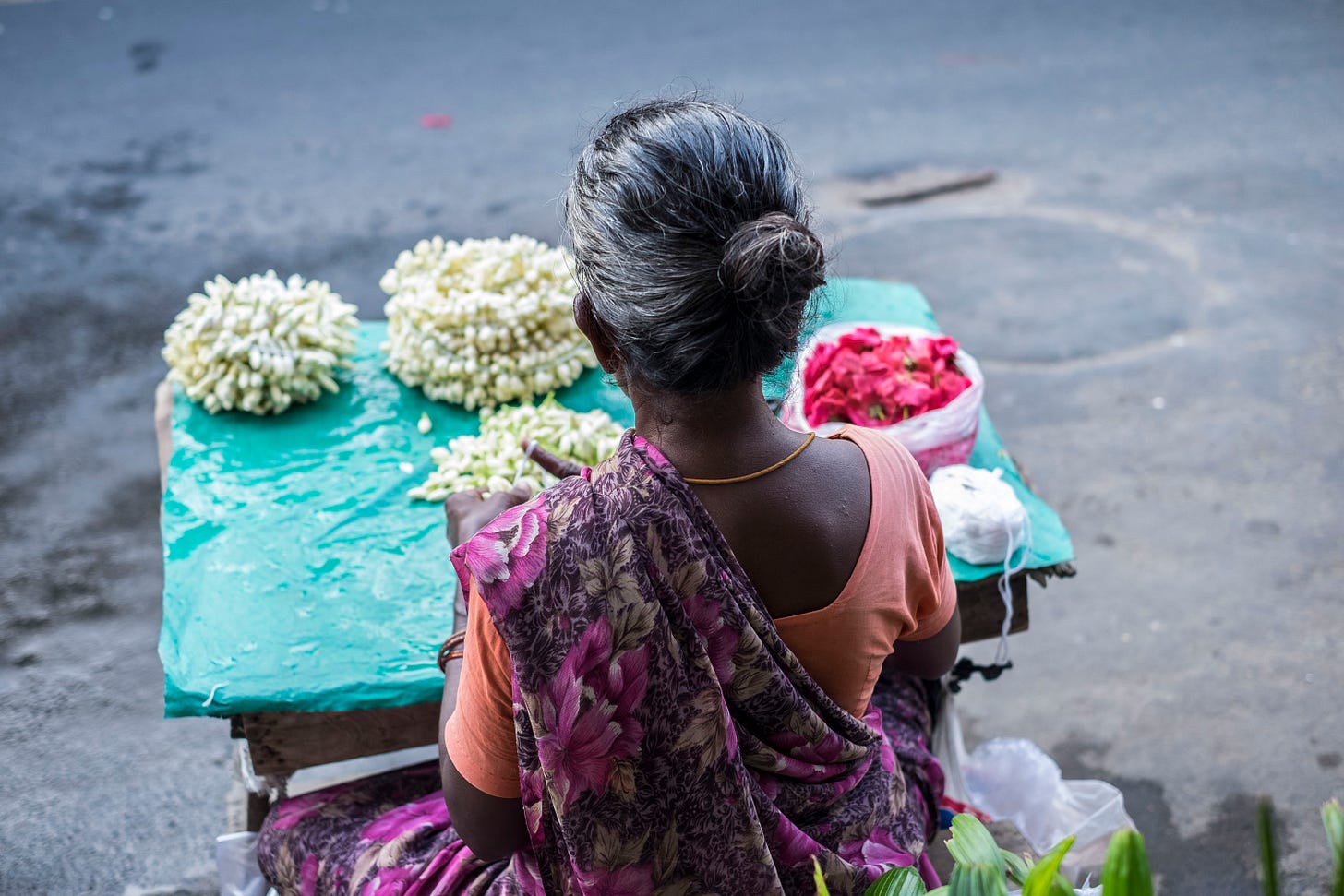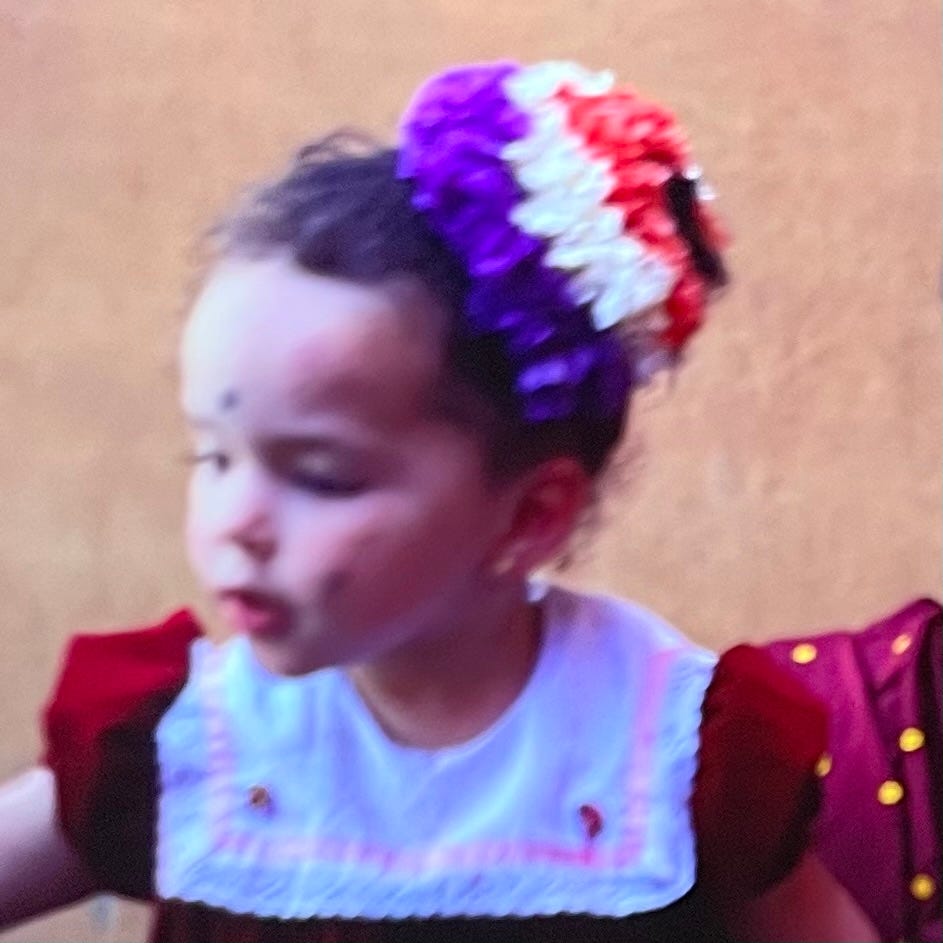In the forest where I live, we recently experienced a multi-day power cut after a tropical rainstorm, which prompted me to head to town to purchase some of my favourite soy candles from a local artisan. As Lupita showed me around her new shop, set in the gorgeous and well-kept traditional hacienda of one of her friends who lives abroad, she brought me to a tree with most of its buds yellowing. She reached her hand out and plucked a hidden white blossom, placing it in my palm. I brought the delicate petals to my nose and inhaled, my entire body shuddering with olfactory nostalgia that sent me across the seas from my home in Western Mexico to my mother’s birthplace, Madras.
Jasminum Sambac, aka Arabian Jasmine, is a plant commonly found in South India and is so culturally ubiquitous that it is practically indivisible from my sensual knowledge of Tamil Nadu. There, women pin malli poo—jasmine flower— garlands to their coconut-oiled hair. On street corners, women sit in front of baskets of white buds, expertly tying them on cotton thread destined for the tresses of schoolgirls and grandmothers alike. For me, jasmine belongs to my memories of my motherland, and even the faintest of whiffs of her delicate aroma sends me into a tailspin of longing to sit behind a woman on a bus in South India, wind whipping through her long black hair, the fragrance of jasmine flowers perfuming our journey.
Is there no greater tribute to beauty in this world than to be in a place where women hang fragrant flowers from their hair?
This aromatherapy experience, which I had with my sentimental flower, coincided with the week of my mother’s retirement after 25 years of service at Costco and a lifetime of work since arriving in Canada in 1981 at the age of 25. Jasmine, coconut, and camphor were certainly replaced with a world of new smells, but the Indian aromas of her homeland would become the scents of my childhood, the perfumed threads of my Dravidian culture that still intoxicate and captivate me today.
Although I grew up in Canada, the scents that are familiar to me are those of milk and cardamom boiling on the stove to make payasam and of cumin and onion frying in ghee. My body knows the musty odour of block-printed Madras cotton from my mother’s nightgowns and the gifts I received from my faraway family as a child. The scent of ginger boiling on the stove makes my tongue ready for afternoon chai. And malli poo makes me feel like my ancestors are whispering through the petals, reminding me of a vital strand of my identity.
As an immigrant to Canada, never again to return to live in her native place, I can only imagine my mother’s sacrifice in giving up a homeland and its inextricable connection to her first existential memories, which were stored in the form of smells, where she first made sense of this world.
Our sense of smell is intimately linked to the limbic system—the oldest, most primal part of our brain, where emotions, memories, and instincts reside. Unlike our other senses, which follow a more logical, winding path through the brain, scent bypasses the cerebral cortex and goes directly to the amygdala and hippocampus, the centers of emotion and memory. This is why a single breath of jasmine, turmeric, or wood smoke can unravel time, pulling us back to childhood kitchens, ancestral rituals, or moments we didn’t know had made such a profound impression on us. Long before we spoke words or formed thoughts, we felt the world through scent—our mother’s skin, warm milk, the earth after rain—and these olfactory imprints became the silent architecture of our earliest sense of belonging.

That is why my soul yearns for the jasmine-scented summer swelter of Madras, why I love the smell of wheat flour chapatis toasting on the stove in my Mexican kitchen, and why I wear Nag Champa essential oil as a perfume, stinking as though I have just hotboxed my house with incense. It is also why I rushed to a local garden store in town, hunting down a jasmine plant to add to our evolving garden, which bloomed its first tender petals and sent the aroma of her birth wafting up to the second-floor balcony where I write this.
As I held on to my little blossom of Arabian jasmine for hours, rolling her through my fingers, holding her to my nostrils in cupped hands, inhaling her essence into my being like nectar for my soul, the perfume reminded me that no matter where I am, I can connect to my motherland through the smells that bring her alive in me.
Scents are pathways to belonging, reminding us of our connection to the Earth and significant events in our lives, traditions, and identity. Fragrance is a way to ground ourselves into a deep sense of self, anchoring to the very bedrock of our existence.
So, if you need a little reminder of who you are, follow your nose back home.
Writing Prompt for Reflection
What smell instantly transports you to your ancestral roots?
Describe a moment when a scent—spice, flower, smoke, earth, or kitchen—opened a doorway to memory, to a place or a person. Let the aroma guide you: Where are you? Who is with you? What story is asking to be told through this fragrance? What does this scent tell you about who you are?
Write as if your nose is the storyteller and your body remembers everything.
I’d love to hear about a fragrance that tells your story in the comments section.











Reading this as I sit here imbibing the scent of fresh cut lilacs on my table - I can't say that particular scent takes me back to my childhood, but I have been reflecting a lot lately on the profound healing medicine that flowers bring to us. So this piece of writing feels very timely for me! Thank you for taking me all the way to South India (and back to Mexico!) for a smell of Arabian Jasmine and a window into a culture where women wear flowers in their hair.